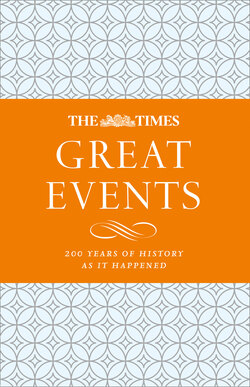Читать книгу The Times Great Events - Группа авторов - Страница 40
ОглавлениеTHE OLYMPIC MARATHON
25 July 1908
And at last he comes. A tired man, dazed, bewildered, hardly conscious, in red shorts and white vest, his hair white with dust, staggers on to the track. It is Dorando, the Italian. He looks about him, hardly knowing where he is. Just the knowledge that somehow, by some desperate resolve of determination, he must get round that 200 yards to the tape of the finish keeps him on his feet. Fifty yards, and it cannot even do that. He falls on the track, gets up, staggers on a few yards and falls again, and yet again; and then he reaches the last turn. The goal is in sight, though his closed eyes cannot see it. He is surrounded by officials almost, if not quite, supporting him, urging and cheering him on. If they were not there he would fall. He cannot run straight. And yet 50 yards from the end he suddenly bursts into a pathetic, almost a horrible, parody of a spurt, drops again ten yards from the tape, rises, staggers forward over those last terrible few yards, and has reached the goal.
But not with much to spare. Hayes, of the United States, follows him into the Stadium, a long way behind him in time, but comparatively a fresh and strong man, who can actually run, and is fast catching him up. Not quite, however, though he has run a magnificent race. So have several of the Americans. They come in, one after the other, Americans, Indians, Canadians, none of them happily, in the same dreadful state as Dorando, the Italian, but with a bewildered look on their faces, drawn and pale with exhaustion, as though wondering what they are doing. It seems as if the first Englishman will never come. And all the time the cheering goes on, every few minutes swelling round the course into a louder roar, as one by one they come. For if only one man can win, it is something even to finish in this Marathon race. Dorando was very ill after leaving the track, but it was afterwards announced that he was out of danger.
The Americans protested against Dorando’s win on the ground that he received assistance, and the protest was finally sustained by the council. So that, after all, the unfortunate man had his agonized struggles to no purpose. Altogether the finish of the race was far from satisfactory. The rule about attendants not being allowed on the course was flagrantly broken. The position of those in authority was undoubtedly difficult. It seemed inhuman to leave Dorando to struggle on unaided, and inhuman to urge him to continue. It did not seem right that thousands of people should witness a man suffering as he did. It seemed hard that he should lose the victory after having reached the Stadium so long before anyone else. And yet, after all, the race was not to the Stadium entrance, but to the finish in front of the Royal box, and it is extremely doubtful whether, by his own unaided exertions, Dorando could ever have got so far. And the Americans, who enjoyed the signal honour of providing three out of the first five men home, are justly entitled to the special glory of claiming the actual winner.
The Olympic Games of 1908 were held in London from April until October. The Marathon – the first run over what became the official distance of 26 miles 385 yards (42.2 kilometres) – was staged on an unusually hot day in July.
The field set off from Windsor Castle. By the time it neared the Olympic stadium at White City, in west London, the diminutive Italian Dorando Pietri had overtaken the favourites to open a substantial lead. However, exhausted and dehydrated, he first ran the wrong way around the track before falling to the ground.
Implored by the 75,000 spectators, officials helped him to his feet four times as he struggled to reach the finish line, eventually staggering across it 10 minutes later, a little ahead of the American, Johnny Hayes.
Pietri had allegedly been given a reviving injection of strychnine by his trainer during the race and after it lay near death in hospital for several hours; the newspapers recalled the fate of the first runner from Marathon, Pheidippides.
However, Pietri became a popular hero and was presented with a commemorative cup by Queen Alexandra. Pietri retired at 26 and invested the vast sum he had made from appearance money in a hotel, only for it to fail.
